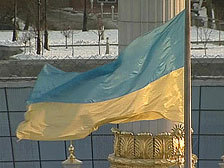Ukraine needs sterile language for its linguistic greenhouse
A few days ago, news reports from the CIS would very often begin with the phrase: "The language controversy in Ukraine continues." As we know, this law gave the Russian language the regional status (the status was given to the languages of other national minorities, constituting not less than 10 percent of the population of a region). This allows the use of the Russian language in business, court, education and television together with the Ukrainian.

Everything changed on July 6th overnight - public actions ended. People were unwilling to go to any pickets and demonstrations in 35-degree heat (Celsius). However, it was not the weather that made people change their minds.
"Orange" leaders have lost their reputation in the eyes of voters entirely. They are professionally incompetent, they do not keep their promises and they squabble with each other constantly. More importantly, the country's GDP and the living standard of the population have been decreasing. The indexes dropped twice in comparison with Russia and 1.5 times - as compared with Belarus.
It appears that orange leaders may find their supporters only if they pay them. Opposition speakers tried, of course, to sweeten the pill with their moaning about the police stopping buses with protesters at the entrance to Kiev. According to them, it was the reason that did not let them arrive on time. However, thousands of people make their way to Kiev bypassing police cordons - by regular buses, shuttles, trains, or by hitchhiking in the end. The actions against the Russian language continued for four days - that was more than enough to get to Kiev even from somewhere far away.
Regional and city councils of Lviv, Rovne and some other cities in the region urged Yanukovych not to sign the law. Lviv picketers were slightly more active. They did not let high-ranking officials enter the city administration, if officials refused to sign a paper saying they condemned the controversial law. Most officials did not mind putting their signature on those papers. They were apparently inspired by a statement from a local leader, the head of the Lviv regional branch of the Party of Regions, Peter Pisarchuk. He stated soon after the vote on the language law that he was withdrawing his vote in favor of the law.
In Luhansk, a mass rally took place in support of the law. More than two thousand people took part in the meeting. In addition, the local regional council approved a rather strong statement in support of the Russian language. Rodion Miroshnik, director general of the Luhansk regional state-run TV and radio company gave the following description of the language riot in Ukraine.
"They say that the Ukrainian language is oppressed, the Ukrainian language must be protected." What kind of language is it and why is it so miserable that it should be protected against everything? Should the Ukrainian language be growing in a greenhouse? It appears that if we teach this language to our children, we deprive them of all, we raise a sub-human race. The race that is deprived of the vast amount of knowledge that comes in Russian, English or any other language. We relieve the new generation of this knowledge. With the support of the state the Ukrainian language can develop, but not in a greenhouse. It can happen in a competition with other languages that live on the territory of Ukraine."
The leaders of the opposition could only make the best of a bad bargain. So they did, having pleased their supporters with a good music concert. In the evening of July 6th, they declared their victory: Vladimir Litvin, the speaker of the Ukrainian Parliament, did not sign the law.
The fact that Litvin refused to sign the law can hardly be considered a weighty argument for the adversaries of the Russian language in Ukraine. To begin with, the speaker of the Parliament has changed many of his opinions on key issues of national policies, having thus discredited himself in the eyes of journalists. Further, according to sociologists, Litvin's "People's Party" is not destined to overcome the five percent barrier to pass to the parliament during the fall elections.
Also, if Litvin leaves on vacation or goes on a sick leave, First Deputy Speaker - Communist Adam Martynyuk - will be able to sign the bill before submitting it to the president for approval. The are no insurmountable obstacles for the signing of the language of the law on the sidelines of Parliament left.
Will Yanukovych sign the law? His representative in parliament, Yuri Miroshnichenko, said at a television talk show that "the President instructed officials to prepare amendments to improve the bill."
Developing cooperation with Russia is certainly a significant factor in the fate of the Russian language in Ukraine. A meeting of presidents of both countries will play a crucial role at this point. The presidents will meet to discuss natural gas in the first place, of course. Kiev wants to cut the price on natural gas and to coordinate supply volumes to its advantage. And if the Ukrainian authorities fail to settle these crucial issues, a social explosion may occur. When choosing between bankruptcy and higher prices for the population, the country's leadership may choose the latter.
Yuri Nosovskii
Pravda.Ru
Subscribe to Pravda.Ru Telegram channel, Facebook, RSS!

